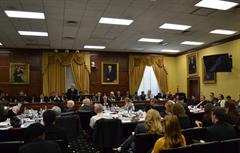 |
|
Email Newsletter     |
|
|
Recently in Washington Last week the House passed three appropriations bills: H.R. 5325, the Energy and Water Development Appropriations Bill, H.R. 5855, the Department of Homeland Security Appropriations Bill, and H.R. 5882, the Legislative Branch Appropriations Bill. Congressman Simpson supported passage of all three bills. The House also passed H.R. 436, the Health Care Cost Reduction Act of 2012, which repealed the excise tax on medical devices among other provisions. House Funding Bill Restores Nuclear Energy Funding Idaho Congressman Mike Simpson last week praised the work of the House Appropriations Subcommittee on Energy and Water Development in crafting a bill that reverses Obama Administration cuts to nuclear energy programs and continues progress toward the development of new nuclear technologies, including those under development at Idaho National Laboratory. Simpson is a senior member of the Subcommittee, serving as one of its members for over nine years. “I am very pleased that the Subcommittee and the House of Representatives have once again demonstrated their support for the development of nuclear energy and provided the resources necessary to continue our nation’s progress on new and promising nuclear technologies,” said Congressman Simpson. “Idaho National Laboratory plays a vital national and international role in leading the development of new nuclear technologies, and this bill will help maintain and expand that role in the future. The House had to make some very difficult choices about where to focus limited taxpayer resources, and I am very grateful for the confidence my colleagues have shown for nuclear energy in this bill.” The fiscal year 2013 Energy and Water Development Appropriations Bill includes $765 million for the DOE’s Office of Nuclear Energy, level funding with FY2012 and $89.9 million above the Obama Administration’s FY2013 request when adjusted for INL’s Safeguards and Security funding. Nuclear energy research and development programs that receive funding within the $765 million allocation include: • The Idaho Facilities Management account, which covers infrastructure maintenance and improvement at Idaho National Laboratory, received $162 million which is $10 million above the President’s request; In addition, the bill contains $93.35 million for Idaho National Laboratory’s Safeguards and Security function which was moved out of the Office of Nuclear Energy account and into the Other Defense Activities account. Beyond funding for the Office of Nuclear Energy, the bill includes $399.6 million for cleanup activities associated with the Idaho Cleanup Project and the Advanced Mixed Waste Treatment Project co-located on the Idaho desert with Idaho National Laboratory. The funding level of $399.6 million is level with the President’s request and $14.9 million above the FY2012 funding level of $384.7 million. Overall, the Energy and Water Development Appropriations bill provides $32.1 billion dollars for the functions of the Department of Energy, the Army Corps of Engineers, the Bureau of Reclamation and a number of independent agencies, including the Nuclear Regulatory Commission and the Bonneville Power Administration. This level of funding represents a reduction of $965 million below the President’s request. “I am pleased this bill lays out a clear, consistent and logical approach to improving our nation’s energy independence by understanding the role all energy technologies play in our energy mix and by appreciating the role nuclear energy plays in particular,” said Simpson. “This funding restores cuts to important reactor programs and ensures INL remains at the forefront of nuclear energy research and development both nationally and internationally.” The bill was approved by the House of Representatives with a final vote of 255-165 and now awaits negotiations with the Senate once its bill is finalized. House Passes Health Care Cost Reduction Act “Idahoans have made their voices loud and clear that jobs and the economy are the most important issue to them,” said Simpson. “A lot of people in Washington say a lot of things about jobs, but talk is cheap. Congress must to act to allow for job growth and protect those who do have employment, and this tax on medical devices is a job killer. We need to repeal it.” The medical device industry employs more than 400,000 people across the country, and a vast majority, 80%, of medical device companies are small businesses with less than 50 employees. There are estimates that this tax could lead to the loss of tens of thousands of jobs when it comes into effect in 2013. “The reason this tax really hurts these businesses is because it taxes sales, not profits,” added Simpson. “If a company had $1 million worth of sales, giving them a profit of $100,000 for the year, the tax would be $23,000. That is almost one-quarter of a company’s profits. That is a serious blow for any size business.” If a company cannot absorb the new tax, they would be forced to move jobs overseas or increase the cost of their product. “The reality is this tax will drive jobs and innovation away. As a former dentist I know it would increase the costs for healthcare consumers in the form of higher device and drug prices and higher insurance premiums.” The cost of H.R. 436 is fully offset and the Congressional Budget Office estimates it would decrease the deficit by $6.7 billion over ten years. It now moves to the Senate for consideration. In the News INL officials pleased with amount of funding in U.S. House bill Sven Berg, Post Register, June 7, 2012 Idaho National Laboratory officials are relieved that a key congressional bill leaves the lab's core funding source unscathed. After President Barack Obama requested a $90 million cut next fiscal year to the U.S. Department of Energy's Office of Nuclear Energy, the U.S. House of Representatives' Energy and Water Development subcommittee produced a bill that called for level funding. "That's definitely a move in the right direction," INL spokeswoman Amy Lientz said. The bill passed the full House Wednesday by a vote of 255 to 165. Lientz credited Mike Simpson, eastern Idaho's representative in Congress, with sparing INL, which has received nearly 60 percent of the Office of Nuclear "He's very engaged in what we're doing," Lientz said. "He understands the importance (of INL) and the role that we play." The next step for the Office of Nuclear Energy's budget is a Senate version of the Energy and Water bill. Traditionally, both the House and Senate would pass bills and negotiate a final version in conference. The resulting bill would then go before both chambers for a vote. But Congress has struggled in recent years to come to terms on subcommittee appropriations bills, resorting instead to unified omnibus bills that incorporate funding levels for all spending lines. Brad Hoaglun, spokesman for U.S. Sen. Jim Risch, R-Idaho, said that scenario could play out again this year. "It is likely 2013 spending bills will be dealt with after the election and lumped into one large omnibus bill," Hoaglun said in an email. "Regardless, Senator Risch would like to see funding at the levels approved by the House subcommittee earlier this week. Whether or not that can be achieved, it is too early to tell." |
MEDIA CENTER
 Celebrating 25 Years of the GI Bill  House passes Energy and Water, Homeland Security and Legislative Branch Appropriations bills If you are having trouble reading this message, try viewing the web version |
| BIOGRAPHY | NEWS CENTER | ISSUES | SERVICES FOR YOU | 2ND DISTRICT | CONTACT | |